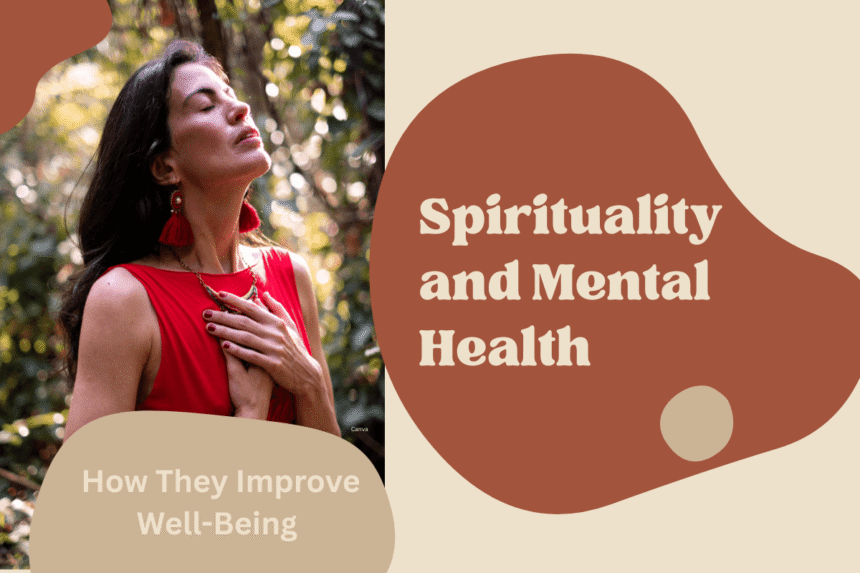Spirituality and mental health are deeply connected. Just as physical health strengthens the body, mental health strengthens the mind. Without emotional balance, even a strong body feels tired and restless. In today’s fast-paced world, stress, anxiety, and loneliness are everywhere. People are searching for peace beyond material success. Spirituality offers that inner calm. It guides the mind, nurtures resilience, and helps find purpose. Spirituality reminds us that life is more than daily struggles. There is meaning, hope, and growth even in difficulties.
The Relationship Between Spirituality and Mental Health
Spirituality and mental health share a deep and supportive connection. Spirituality helps individuals find meaning, purpose, and inner peace, especially during challenging times. It encourages self-reflection, compassion, and acceptance—qualities that strengthen emotional resilience. People who engage in spiritual practices such as prayer, meditation, or gratitude often report lower stress levels, reduced anxiety, and a greater sense of hope and belonging.
At the same time, spirituality fosters a positive mindset that promotes healing and personal growth. It helps people cope with loss, uncertainty, and life’s pressures by offering comfort beyond material concerns. When integrated with mental health practices, spirituality becomes a powerful source of balance—nurturing not just the mind, but also the heart and soul.
Spirituality: Beyond Religion
Spirituality is often mistaken for religion. Religion follows traditions, rituals, and beliefs. Spirituality is personal. It is about connecting with yourself and the world around you. Spirituality helps us understand life’s deeper meaning.
Some people find spirituality through prayer and worship. Others find it in meditation, yoga, service, or nature. A volunteer feeding the poor, an artist creating beauty, or a teacher helping students—all live spiritually. Each path aims for inner peace and understanding.
As Rumi said, “You are not a drop in the ocean. You are the entire ocean in a drop.” Spirituality teaches us to see the bigger picture. It helps us feel connected, peaceful, and whole.
The Importance of Mental Health
Mental health is more than the absence of illness. It is emotional stability, strength, and clarity of thought. It allows people to face challenges, build relationships, and make wise decisions. A healthy mind experiences joy, peace, and satisfaction even in adversity.
Stress, anxiety, and depression are rising worldwide. People chase success and recognition but neglect mental well-being. Without emotional balance, life feels meaningless. Spirituality supports mental health by calming the mind and providing purpose. It allows us to handle life’s difficulties without despair.
How Spirituality Improves Mental Health?
Spirituality affects mental health in many ways. It reduces stress, builds resilience, strengthens relationships, and provides purpose.

1. Spirituality Reduces Stress and Anxiety
Stress weakens the mind and body. It affects sleep, focus, and mood. Spiritual practices reduce stress naturally. Meditation, deep breathing, and prayer are highly effective.
When you meditate, your body relaxes. Heart rate slows. Cortisol, the stress hormone, decreases. The mind becomes calm and focused. You handle problems with clarity.
For example, a teacher overwhelmed by work may meditate for ten minutes each morning. She notices reduced tension, better patience, and more control over her emotions.
Prayer also offers comfort. Talking to a higher power or setting positive intentions can release anxiety. Spirituality teaches acceptance. It helps people see that some events are beyond control.
As Buddha said, “The mind is everything. What you think, you become.” – Goodreads
A calm mind creates a peaceful life.
2. Spirituality Builds Resilience
Life is full of challenges. Loss, illness, and failures can feel overwhelming. Spirituality strengthens resilience. People with faith see difficulties as temporary and meaningful.
For example, someone who loses a job may feel despair at first. Spiritual reflection or prayer can help them see it as a chance for growth. They may find a better opportunity or learn new skills.
Viktor Frankl said, “When we are no longer able to change a situation, we are challenged to change ourselves.” Spirituality transforms suffering into growth. It provides hope and courage to keep moving forward.
3. Spirituality Promotes Self-Acceptance
Self-criticism and guilt are major mental health challenges. Spirituality encourages acceptance. It teaches that every human being is valuable.
Through meditation or reflection, we learn to forgive ourselves. Mistakes become lessons, not sources of shame.
A student who failed an exam may initially feel hopeless. Spiritual practices help them accept the outcome, recognise their strengths, and try again. Self-acceptance improves confidence and emotional health.
4. Spirituality Strengthens Relationships
Good relationships support mental health. Spirituality encourages love, compassion, and empathy.
Group prayers, meditation sessions, and community service foster social connections. They reduce loneliness and build belonging.
In India, temples, mosques, churches, and gurukulas are not only places of worship—they are hubs of social support. People meet, share, and grow together. Spirituality teaches that love and service to others strengthen the heart.
Mother Teresa said, “If we have no peace, it is because we have forgotten that we belong to each other.”
5. Spirituality Gives Life Meaning and Purpose
Humans naturally seek meaning. Without purpose, life feels empty. Spirituality answers this need. It provides direction and hope.
Spiritual people see life as a journey, not a series of random events. Challenges are opportunities to learn and grow.
A person who loses a loved one may initially feel grief. Spirituality helps them accept the loss, find gratitude for memories, and continue living with hope. Life gains meaning, even in hardship.
Science Supports Spiritual Practices
Modern science confirms spirituality’s benefits for mental health. Research shows that spiritual practices lower anxiety, reduce depression, and improve recovery from addiction.
Harvard studies reveal that regular meditation increases grey matter in the brain. This enhances memory, emotional control, and decision-making. People with spiritual beliefs often recover faster from trauma and experience higher life satisfaction.
Spirituality is no longer just faith—it is therapy for the mind. It strengthens the brain, emotions, and overall well-being.
Spirituality in Indian Culture
India has a rich tradition of weaving spirituality into daily life. Religious worship centres, retreat centres, and yoga centres have long emphasised the harmony of mind, body, and soul.
Spiritual gatherings provide social support, peace, and connection. Group prayer, meditation, and service create belonging and strengthen mental health.
Modern urban life also incorporates spiritual practices. Yoga studios, meditation apps, and community service projects offer opportunities to nurture both the mind and spirit.
Practical Tips to Strengthen Spiritual and Mental Health
- Start the Day with Silence
Spend a few minutes every morning in meditation, prayer, or quiet reflection. This sets a peaceful tone for the day. Even five minutes of focused breathing reduces anxiety. A professional might sit with eyes closed, breathe deeply, and set positive intentions. - Practice Gratitude
Write down three things you are thankful for each night. They can be small, like a warm meal or a smile from a friend. Gratitude builds positivity and resilience. People who practice it regularly report higher happiness and lower stress. - Engage in Service
Helping others provides emotional fulfilment. Volunteer at charities, help neighbours, or mentor someone. Acts of kindness reduce self-centred thoughts and give purpose. For instance, a college student teaching underprivileged children experiences joy and calm. - Connect with Nature
Nature heals the mind. Walk in parks, gardens, or forests. Observe birds, trees, and rivers. Nature reduces stress and improves mindfulness. A morning walk along a river can restore energy and focus. - Read Spiritual Books or Listen to Talks
Spiritual books and talks provide guidance and inspiration. Even ten minutes daily can change perspectives. Reading spiritual books encourages patience, compassion, and calm. - Reflect Daily
Spend time thinking about your actions, thoughts, and emotions. Journaling helps. Ask: Did I act with compassion? Did I handle stress wisely? Reflection strengthens self-awareness. For example, a manager reflecting on a difficult meeting can improve future responses. - Practice Mindful Breathing
Slow, deep breaths calm the mind. Inhale for four counts, hold for four, exhale for four. Mindful breathing lowers heart rate and stress instantly. Students or professionals can use this before exams or presentations. - Maintain a Positive Company
Surround yourself with uplifting and supportive people. Join meditation groups, book clubs, or service projects. A positive company encourages spiritual growth and reduces loneliness. - Incorporate Daily Rituals
Small rituals anchor the mind. Light a candle, chant a mantra, or perform short yoga sequences. Rituals help focus attention and create stability. Five minutes of morning prayer can set a positive tone for the entire day. - Express Creativity
Painting, music, writing, or gardening allows emotional expression. Creativity nurtures the soul and calms the mind. Painting a landscape or composing a simple song can provide relaxation and joy. - Limit Digital Overload
Reduce time on social media, news, or screens. Spend at least an hour offline daily. Use this time for meditation, reflection, or nature walks. This reduces anxiety and frees mental space. - Celebrate Small Wins
Acknowledge achievements, no matter how small. Completing a meditation session, helping someone, or finishing a task deserves recognition. Small celebrations improve confidence and happiness. - Practice Forgiveness
Holding grudges drains energy and increases stress. Spirituality teaches forgiveness. Letting go of anger heals the mind and relationships. For example, forgiving a colleague’s mistake can restore peace and prevent resentment. - Engage in Regular Exercise
Physical activity complements spiritual and mental health. Yoga, walking, or stretching improves mood and reduces anxiety. Exercise and spirituality together create a balanced mind and body. - Set Intentions, Not Just Goals
Goals focus on outcomes, intentions focus on purpose. Start the day with an intention: “I will act with kindness,” rather than “I must finish work.” Intentions create mindful, meaningful action.

Conclusion
Spirituality and mental health are inseparable. Spirituality calms the mind, heals emotional wounds, and fills life with meaning. It strengthens resilience, reduces stress, and nurtures compassion.
Daily spiritual practices—prayer, meditation, service, self-reflection—provide mental clarity, peace, and happiness. Modern science supports these benefits. Spirituality is both a mindset and a lifestyle.
Just as physical health is essential, spiritual well-being is crucial for mental health. By combining both, we can live balanced, peaceful, and purposeful lives. Spirituality and mental health together create a strong foundation for happiness and inner growth.
Are you ready to integrate spirituality into your daily life to strengthen your mental health and find lasting peace?
Explore more inspiring articles on spirituality, happiness, and mental wellness at Simply Life Tips.
5 FAQs on Spirituality and Mental Health
1. How does spirituality improve mental health?
Spirituality calms the mind, reduces stress, builds resilience, and provides a sense of purpose. Practices like meditation, prayer, and service enhance emotional well-being.
2. Can meditation and prayer really reduce anxiety?
Yes. Studies show meditation lowers cortisol, the stress hormone, and prayer provides emotional comfort, helping people manage anxiety effectively.
3. Is spirituality only about religion?
No. Spirituality is about inner connection, purpose, and compassion. It can be expressed through meditation, yoga, service, or mindful reflection, beyond formal religious practices.
4. How does spirituality strengthen relationships?
Spirituality encourages love, empathy, and forgiveness. Group meditation, prayer, and service activities create social support, reduce loneliness, and improve emotional bonds.
5. Can spiritual practices help during crises?
Absolutely. Spiritual people view challenges as part of a larger purpose. This mindset builds resilience, hope, and courage to face difficulties without despair.
Thank you for taking the time to explore this post. I hope you found it both insightful and enjoyable.
Remember, your sharing can make a positive impact! Please share this post across your social media and other networks, allowing others to gain from its content.
PVM

Mathukutty P. V. is the founder of Simply Life Tips, a blogger, content writer, influencer, and YouTuber passionate about learning and sharing. Guided by “Simple Living, Creative Thinking,” he believes in the power of knowledge sharing and lifelong learning.







